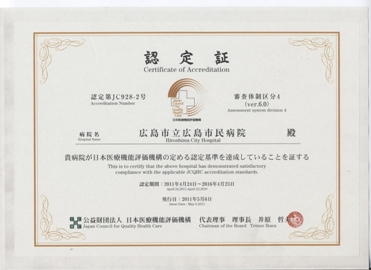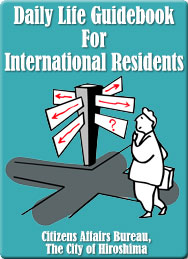Hospital Overview

Greeting from the Hospital Director
Welcome to our website.
Hiroshima City Hiroshima Citizens Hospital was established in August 1952 during the postwar reconstruction period seven years after the atomic bomb was dropped on Hiroshima. Over the next 70 years, the hospital has received a variety of tangible and intangible support from the citizens and residents of Hiroshima and through the dedicated efforts of all concerned with the hospital. And now, it has become a key hospital supporting medical care in Hiroshima. Our mission is to provide safe, high-quality and compassionate medical to earn the trust and satisfaction of patients, especially emergency and highly specialized care is one of our strengths.
We provide emergency medical care from primary to tertiary. The primary emergency care is for walk-in patients, the secondary is for require urgent inpatient care, and the tertiary is for critical care require emergency medical treatment. Numerous walk-in patient primary emergencies are seen in the emergency room every day and the number of ambulance transports for secondary and tertiary emergencies is also very high. Our hospital plays a central role in emergency medical care in Hiroshima.
Our hospital also provides advanced and specialized medical care in a variety of fields, are actively introducing minimally invasive treatment and minimally invasive surgery in cancer treatment. In addition to endoscopic resections for early-stage cancers such as esophageal, gastric, and colorectal cancer, actively performs minimally invasive laparoscopic surgery using thoracoscopes and laparoscopes, which are gentle and low-impact on the body in surgery. In recent years, robot-assisted surgery using surgical robots has been covered by insurance. Base on the fact, we are also actively performing robotic surgery for gastrointestinal, urological, lung, and uterine cancers. As of April 2025, our hospital has two "da Vinci Xi" surgical robots, which are in almost full operation every day performing approximately 500 robot-assisted surgeries per year.
Moreover, it promotes multidisciplinary and holistic cancer treatment that combines surgery and endoscopic treatment with drug therapy using anticancer agents, radiation therapy using advanced treatment equipment, and palliative care in parallel as a base hospital for advanced cancer treatment. The Cancer Genome Medical Center selects more suitable treatment based on each patient's genetic information and leading to personalized cancer treatment.
In the area of cardiovascular diseases, we are actively performing minimally invasive surgeries and treatments such as catheterization for myocardial infarction, angina pectoris, and arrhythmia; stent grafting for aortic aneurysm, "TAVI" for aortic stenosis and "MitraClip" for mitral regurgitation. In cerebrovascular disease as well, we are focusing on minimally invasive treatments such as catheter-based thrombectomy for cerebral infarction.
In perinatal care, our hospital is the core hospital for perinatal care in Hiroshima as a comprehensive perinatal maternal and child care center. The Department of Neonatology has achieved a high life-saving rate for low birth rate infants. We are fully support with complex congenital diseases through the cooperation of multiple departments including neonatology, pediatrics, cardiovascular pediatrics, neuro-pediatrics, pediatric surgery, cardiovascular surgery, and neurosurgery. Our obstetrics Center handles many high-risk pregnancies and deliveries pregnant, and also offers painless deliveries. Furthermore, we are fully prepared to perform super-urgent cesarean sections that require emergency care within minutes by establishing an operating room in the Obstetrics Center.
As mentioned, we provide a wide range of advanced and specialized medical care in other areas as well. It is important for various medical staff to cooperate and collaborate with each other to develop team medicine in order to provide specialized and complex medical care more safely. In our hospital, multiple specialty teams are working in collaboration with various professions.
The birthrate is declining and the population is aging fast. In order to continue to provide optimal medical care to the elderly, people who has various chronic diseases and people with diverse social backgrounds, it is impossible to complete all medical care in an advanced acute care hospital. There will be an increasing need for medical care is completed in the community, in which each patient is treated and supported through organic cooperation and collaboration with various medical facilities with differentiated functions in the community the patient resides. Patients are referred to our hospital from their family clinics or hospitals and return to their original physicians after their acute treatment is over and their condition has settled. If the patient's condition is prolonged and they cannot immediately return to their former life, we might need to transfer them to a hospital or medical facility is performing functions aimed at functional recovery and return to life.
We will fulfill our role and mission of providing emergency and highly specialized medical care by working together as one in our community to save lives, cure illnesses, heal hearts, nursing, healthcare system, medical welfare.
We appreciate your understanding and cooperation with us.
April 2025
Hiroshima City Hiroshima Citizens Hospital
Director Hiroyoshi Matsukawa, MD, PhD.
April 7, 2025
Local Independent Administrative Corporation Hiroshima City Hospital Organization Hiroshima City Hiroshima Citizens Hospital
Hospital Director Hiroyoshi Matsukawa
Principles
As a primary hospital of the City of Hiroshima,
we pledge to respect our patients and practice high quality healthcare.
The Three Foundations for Realizing Our Mission
- Respect our patients and practice medicine that is a model of trust and satisfaction.
- Cooperate with regional healthcare establishments and practice highly advanced medicine,
particularly in the area of acute-phase treatment. - Promote sound management practices to assure safe and dependable healthcare.
Core Principles
Our hospital pledges to abide by the following principles in order to continue improving our medical practices which are based on respect for life and love of humanity, to provide specialized and ethically appropriate healthcare, and to ensure and promote the health and welfare of our fellow citizens.
- To do everything within our power with unlimited love and responsibility to meet the needs of our patients.
- To constantly promote self-improvement, refine our medical skills, pursue the study of medicine, and educate our successors.
- To retain and securely protect all patient records, and guarantee that no personal data will ever be divulged.
- To actively cooperate with other regional healthcare establishments for the purpose of creating a united local healthcare network that can provide medical services in a practical and efficient manner.
Japan Council for Quality Health Care Accreditation
This hospital has been accredited by the Japan Council of Quality Health Care (JCQHC)

What is this accreditation?
This accreditation program is run by the JCQHC, a third-party foundation which impartially evaluates healthcare organizations for the purpose of improving the quality of medicine for the public.
Items of Evaluation
-
Hospital management and the role of the hospital in the community
Evaluation of hospital missions, long- and intermediate-term plans, overall organizational management, data management systems and ties with local public health, medical and welfare organizations. -
Patient rights and safety
Evaluation of respect for individual patient rights, procedures to obtain consent for treatment following thorough consultation and provisions to ensure patient safety. -
Therapeutic environment and patient services
Evaluation of employee behavior towards hospital visitors, visitor assistance, medical counseling for patients and their families, privacy considerations, and therapeutic environment. -
Quality of treatment
Evaluation of basic activities meant to ensure quality treatment and operational proficiency of supporting divisions, and the rating of levels of proper service from the perspective of the patient's treatment history. -
Nursing care
Evaluation of nursing policies, organizational structure, and skill development, and the rating of levels of proper service from the perspective of the patient's nursing history. -
Management and administration efficiency
Evaluation of the efficiency and suitability of human resources, financing/accounting, facility maintenance management and legal defense arrangements.
 Japanese
Japanese




